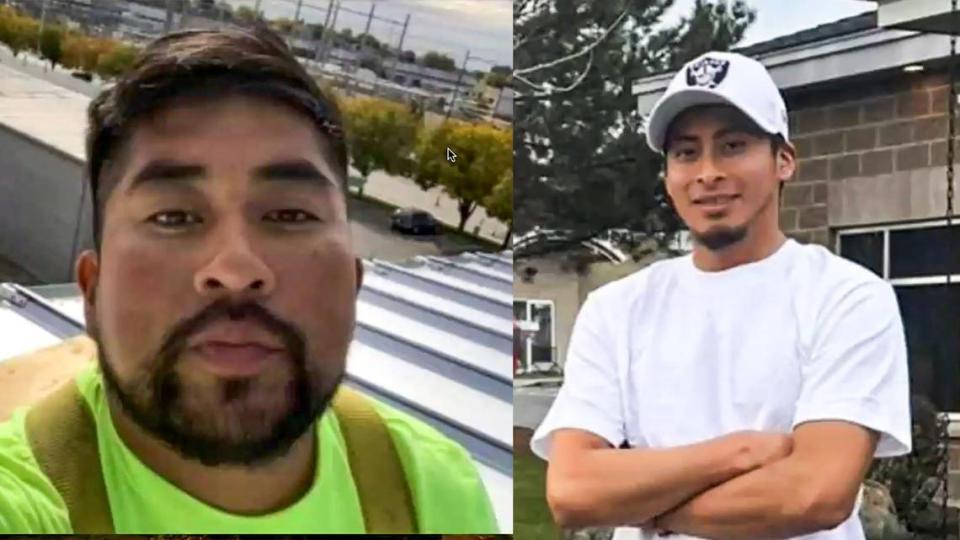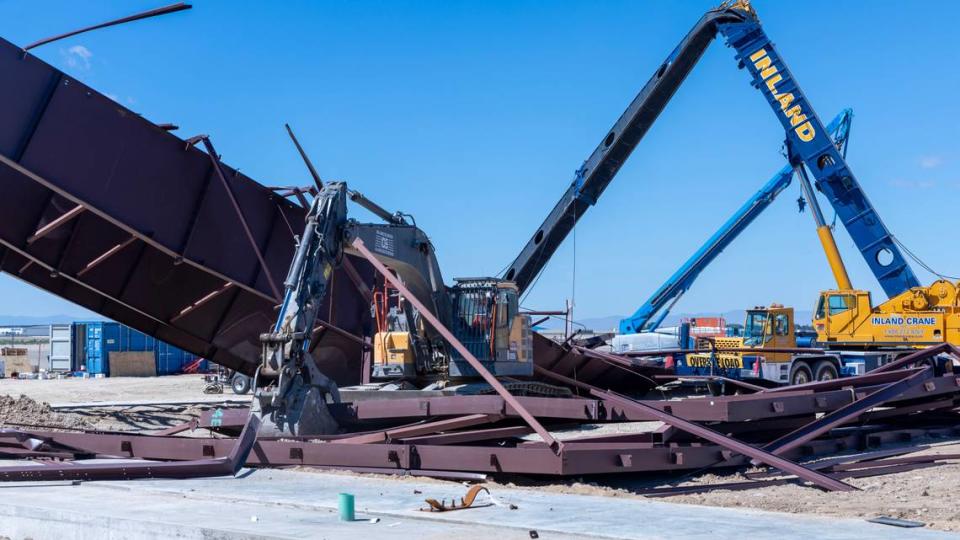Lawsuit says construction firms cut corners, causing Boise Airport hangar collapse
Late in the afternoon on Jan. 31, construction workers Mariano Coc and Mario Sontay were 40 feet in the air, in the basket of an aerial lift at the construction site of a new hangar at the Boise Airport.
Suddenly, the hangar collapsed, and a falling rafter caught the arm of their lift, according to a new lawsuit. Both men, construction workers from Guatemala, were “slammed into the ground,” according to the lawsuit.
Coc, 24, was killed instantly. Sontay, 32, survived about five minutes after impact. Craig Durrant, one of the owners of Big D Builders, the general contractor for the project, was decapitated as he tried to flee the collapsing structure. Nine other workers were injured.

Enrique Serna, the attorney representing Coc’s and Sontay’s families, blamed the collapse on the construction companies involved: Big D Builders, Steel Building Systems, Inland Crane and Speck Steel.
Big D Builders, which is based in Meridian, said the company “disputes the allegations listed in the complaint.” Spokesperson John Segale said the company would not comment further because of the pending litigation.
Inland Crane, which is based in Boise, said “all evidence demonstrates that Inland Crane and our employees are not at fault for this tragedy.” Spokesperson Doug Self said the company is confident that “the judicial process will exonerate Inland Crane and our employees.”
Lawsuit cites ‘bowing beams, snapping cables’
The lawsuit Serna filed Tuesday makes three main accusations:
In an effort to speed up construction, the companies modified building blueprints, causing a “significant reduction” in structural support. They did not get these modifications approved by the city of Boise.
The companies manufactured their own “rushed” and “improperly and poorly welded” materials for the structure’s bracing, rather than using parts that matched the prefabricated steel structure.
The companies allowed work at the site to continue on Jan. 31 despite workers’ reports of “bowing beams” and “snapping cables” a day earlier, and despite high winds on Jan. 31 that created dangerous conditions for operating cranes.
“Rather than stop work at the hangar site to ensure everyone’s safety, all defendants pressed on,” the lawsuit says.

The suit did not mention the city of Boise or its contracted engineering firm, AHJ Engineers, though Serna had accused both of approving deficient building plans in a tort claim filed against the city in May. After reviewing public records Serna’s firm requested from the city, the firm decided no suit against those entities was warranted, Serma said Wednesday at a press conference.
The lawsuit reflects only the findings of Serna’s firm, he said. The result of an investigation by the federal Occupational Safety and Health Administration to determine the causes of the collapse is expected in late July.
Hangar victims were ‘following orders’
Coc and Sontay, employees of Big D Builders, had worked at the hangar site only for a few days before the collapse, according to the suit. They were asked to work there to help speed up the project, which was “significantly delayed,” the lawsuit said.
Serna sued on behalf of the men’s widows, mothers, fathers, children and siblings. Both men sent their families in Guatemala money “on a regular and frequent basis,” according to the suit, and their families “depended on (them) financially.”
Both men “were following orders, just like good husbands and fathers that were sending money, that were paying the bills, that were sending money to mom, dad, sister, brothers,” Serna said. They “were literally raising a village as a result of their efforts.”
The lawsuit did not request a specific amount of money. In the May tort claim, Serna wrote that their families were seeking $30 million.
“At the appropriate time, plaintiffs will seek to amend this complaint to add a claim for punitive damages,” the lawsuit reads.
In a February news conference, Serna shared more details about the men.
“They were very good at their trade,” he said then. “They were very happy in Idaho. They used to go to the Chevron station by the airport to get their morning coffee en route to building this hangar … They were living the American Dream.”
Serna on Wednesday laid the families’ grief at the construction firms’ feet.
“These general contractors have been around the block,” he said. “They build a lot of buildings in Idaho and in the Northwest. This is not their first rodeo. They know better (than) to act like this. A lot of the time, they just think that it’s going to be OK, and that’s worrisome … My clients are dead. Their families are mourning. Are they going to continue these practices? Are we going to lose more people in the future?”
‘Did not look right’: Workers flagged concerns before deadly Boise hangar collapse
Demolition of Boise Airport hangar that killed 3 in collapse is set to begin this week
Families of hangar collapse victims put city of Boise ‘on notice’ of possible lawsuit


